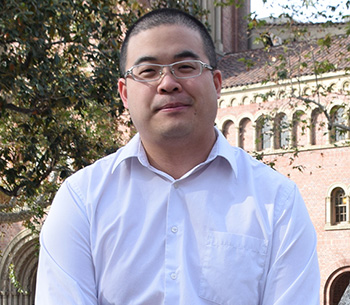
Clarence Leung
Just a few months after he started working at USC Shoah Foundation, Clarence Leung was on his way to Shanghai for the 2015 USC Global Conference.
Leung, who has a background in accounting, joined the staff as a budget analyst in the executive administration department, where he helps track the Institute’s expenses and other financial processes.
In October, when Executive Director Stephen Smith and Director of Research and Documentation Karen Jungblut began making preparations to attend the USC Global Conference, Leung volunteered to accompany them. It was the perfect opportunity to help out and also visit his parents in Hong Kong.
At the conference, USC Shoah Foundation led a panel discussion on “Nanjing: The Power of Survivors’ Stories and Why Capturing them Matters.”
USC Shoah Foundation’s Nanjing Massacre collection was initiated in 2012 by a partnership with Nanjing Massacre Memorial Hall in China with funding provided by the Siezen Foundation. The collection now includes 30 testimonies of survivors of the 1937 Nanjing Massacre.
Smith moderated the panel, which explored why telling stories matters more than you might think and why digital communications are an increasingly essential part of our storytelling oeuvre. On the panel were Nanjing University Professor Xu Xin, USC Trustee Ming Hsieh, Nanjing Massacre survivor Zhi Qiang Chang, and Meyer, whose mother fled Nazi Germany in 1938 to live with relatives in California and gave her testimony to USC Shoah Foundation in 1995.
Leung said the panel was amazing to witness. When a five-minute preview of the upcoming USC Shoah Foundation-produced documentary “Two Sides of Survival” was shown, the audience was visibly moved. The film focuses on the 1937 Nanjing Massacre and the Shanghai Jewish Ghetto during World War II.
“They could feel the power of testimony,” Leung said.
Especially meaningful for Leung was the opportunity to get to know the survivor on the panel, Zhi Qiang Chang, and his daughter. She told Leung that her father shared only bits and pieces of his story with her over the years, until finally he told her everything. As a young boy, when his family was under attack, he had watched as his mother tried to feed his baby brother one last time before she was killed.
Leung felt that going to China and interacting with survivors helped him realize the importance of USC Shoah Foundation’s mission, and his role in it. He must make sure the Institute’s financial procedures are as efficient as possible so departments like education and research can focus on their work and get more done.
We owe it to survivors to use their testimonies to educate future generations, he added.
“We need to respect them, because they gave us a lot of history,” Leung said.